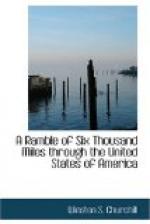brother dead—I see the Sauk kill them in
great numbers—I said that there would be
trouble—I turn to go to my village—I
find I have no provisions—I say, let us
go down to our white brother, and trade our powder
and shot for a little—I do so, and again
turn upon my tracks, until I reach my village.”—He
here paused, and looking sternly down the room, to
where two Sauks sat, pointed his finger at them and
said, “The Sauk, who always tells lie of me,
goes to my white brother and says—the Ioway
has killed your cattle. When the lie (the Sauk)
had talked thus to my white brother, he comes, thirty,
up to my village—we hear our brother is
coming—we are glad, and leave our cabins
to tell him he is welcome—but while I shake
hands with my white brother,” he said, pointing
to his forehead, “my white brother shoots me
through the head—my best chief—three
of my young men, a squaw and his[6] child. We
come from our huts unarmed—even without
our blankets—and yet, while I shake hands
with my white brother, he shoots me down—my
best chief. My young men within, hear me shot—they
rush out—they fire on my white brother—he
falls, four—my people fly to the woods without
their rifles.” He then stated that four
more Indians died in the forest of cold and starvation,
fearing to return to their villages, and being without
either blankets or guns. At length returning,
and finding that their “great chiefs”
had delivered themselves up, he came to stand his trial.
The next person called was an old chief, named “Pumpkin,”
who corroborated the testimony of “Big-Neck,”
but had not been with the party when the Sauks were
seen killing the cattle. When he came to that
part of the story where the Indian comes from his
wig-wam to meet the white man, he said, nearly in
the same words used by Big-neck, “While I shake
hands with my white brother, my white brother shoots
me down—my best chief”—he
here paused, and lifting his eyes above the heads
of the auditors, his lip curling a little, but resuming
again, almost immediately, its natural position, he
pronounced in a low but distinct guttural tone, the
Indian word meaning “my son.”
His eye seemed fixed for a few seconds, and then,
as if conscious of his weakness, and that the eyes
of the great warriors of his tribe were upon him,
he looked slowly round in a kind of solemn triumph,
and resumed his tale. There was a strong feeling
excited in the court by the misfortune of this old
man, for the “best chief” of the Ioways
was his only son. The court asked the chiefs
what they thought should be done in the matter?
They spoke a few words to each other, and then answered
promptly, that all they required was, that their white
brother should be brought down also, and confronted
with them. The prisoners were set at liberty
on their parole.




